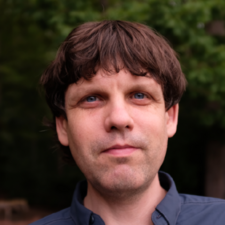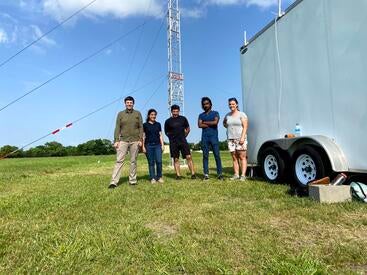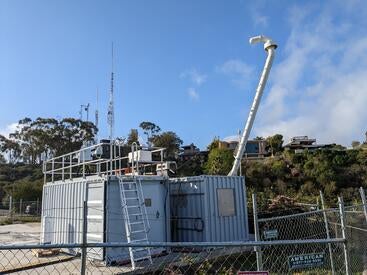CE-CERT Welcomes New Faculty Member: Dr. Markus Petters

In the field of environmental research, the study of atmospheric particulate matter holds great significance. Understanding the properties and behaviors of these tiny particles can have profound implications for human health, climate change, and air quality. At the forefront of this critical field is Dr. Markus Petters, one of our newest faculty members at CE-CERT. While new to CE-CERT, Dr. Petters is anything but new to the field. In this exclusive interview, Dr. Petters sheds light on his research focus, its potential impact, and his aspirations for contributing to a cleaner, healthier planet.
Overview of Research Focus and Impact
Dr. Petters' research group is dedicated to laboratory and field investigations aimed at unraveling the physical and chemical properties of atmospheric particulate matter. The core of their research revolves around understanding when and why these particles transition from a liquid to a solid state, a phenomenon that profoundly affects their volatility and reactivity in the atmosphere. Additionally, the group investigates the direct emissions of ultrafine particles, measuring those with sizes less than 10 nm. These minuscule particles pose serious health threats as they can freely penetrate biological barriers, such as the blood-brain barrier.
One of the significant projects Dr. Petters discusses is funded by the Environmental Protection Agency (EPA), focusing on measuring sub-10 nm particles emitted into the ambient air. This research aims to identify sources and compile emission inventories for these particles in urban environments. Beyond this, the group also delves into the influence of ambient particulate matter on cloud droplet and ice crystal formation, utilizing ground-based and airborne measurements to advance our understanding of these complex processes.

Motivation Behind Choosing CE-CERT
“Feynman once said that ‘if you're the smartest person in the room, then you're in the wrong room,’” Dr. Petters eloquently said when being asked about his motivation to join CE-CERT. He was driven by his desire to collaborate with a talented team of leading researchers and access cutting-edge facilities. He elaborates, "Becoming part of a larger team with similar goals will make my research program more effective working on solving pressing challenges in air quality and climate change."
Turning Setbacks into Success
In the world of scientific research, setbacks are par for the course. Dr. Petters acknowledges that experiments sometimes go differently than planned, but he finds great satisfaction in making them work, even when they deviate from the original vision. He shares, "More often than not, research doesn’t work out as neatly as envisioned in the funded proposal. Making it work as promised is one of the main thrills of the process." This resilience in the face of research challenges underscores Dr. Petters' unwavering commitment to achieving his research goals – a valuable lesson and reminder of the importance of perseverance and determination in the pursuit of knowledge and innovation.
Long-Term Aspirations
Dr. Petters' long-term aspiration for his research lab is to contribute fundamental discoveries to the science of atmospheric particulate matter. He states, "This is a lot to wish for given the mountain of existing knowledge that has been accumulated over the centuries, but with some hard work and some luck, it might happen." Equally important to him is the success and growth of his students. He hopes to provide them with personal and professional development opportunities, nurturing their growth as researchers and seeing them flourish beyond graduation. It’s evident that Dr. Petters is going to be a very valuable addition to the CE-CERT team, not only bringing his expertise but also his dedication to nurturing the next generation of researchers.

Anticipated Research Challenges
In the rapidly evolving realm of research, Dr. Petters identifies a significant challenge as the growing gap between the skills incoming graduate students possess and what it takes to be at the forefront of knowledge. He notes, "There is a growing gap between 'what it takes' to be at the leading edge of knowledge and the skills that the top incoming graduate students bring." His solution lies in mentorship: "Aiming to be as effective as possible in educating and mentoring graduate students and postdocs from a diverse set of backgrounds will be the main means to address these challenges."
Balancing Work and Life
Beyond his dedication to research, Dr. Petters has a passionate hobby: chess. Reflecting on work-life balance, he humorously remarks, "Fortunately, my children do not yet understand 'work,' and this naturally balances any tendency for work to take my time at home."
A Bright Future in Atmospheric Particulate Matter
Dr. Markus Petters reveals a well-rounded scientist with a commitment to research and the nurturing of future scholars. At CE-CERT, we consider ourselves exceedingly fortunate to have him as an addition to our team, where his expertise and mentorship will undoubtedly shape the scientific landscape.
Read more about Dr. Petters' research and lab at https://mdpetters.github.io/